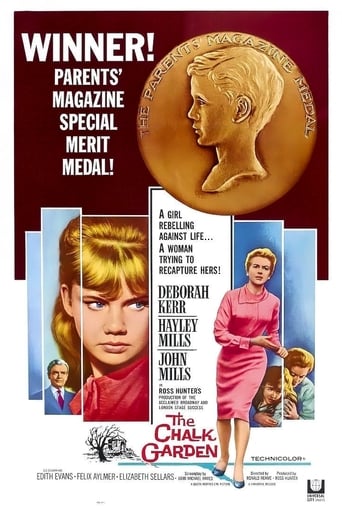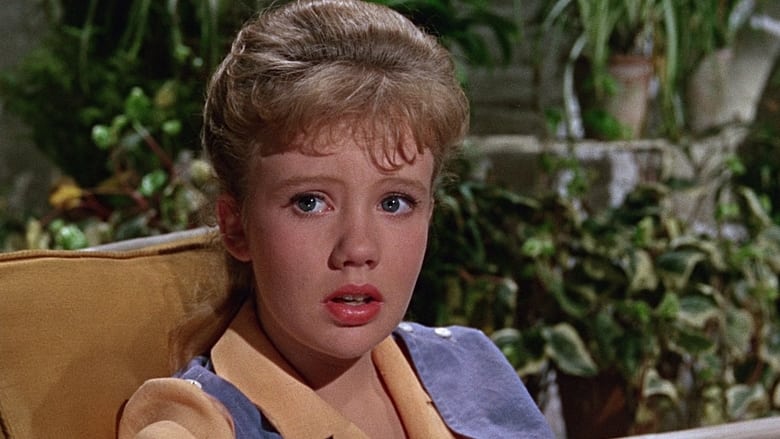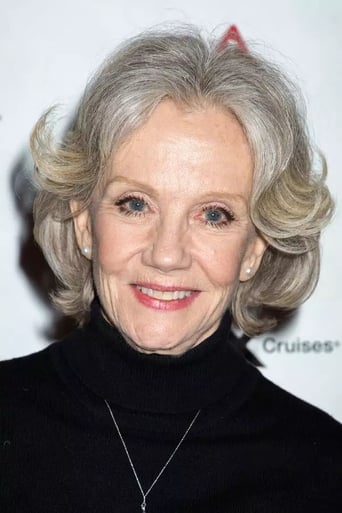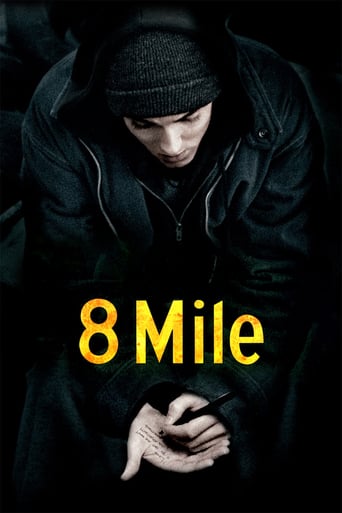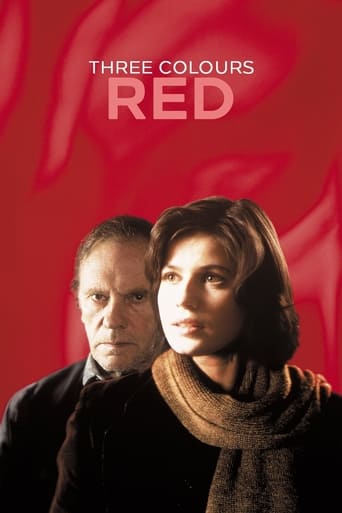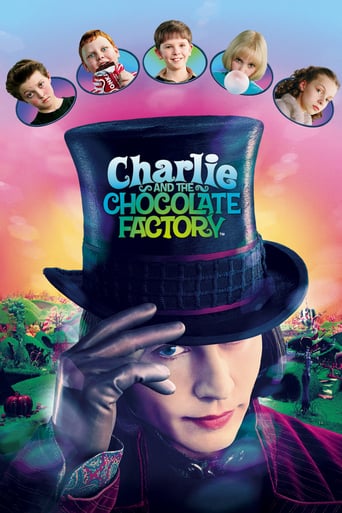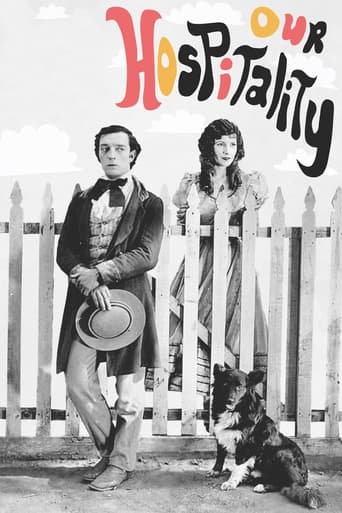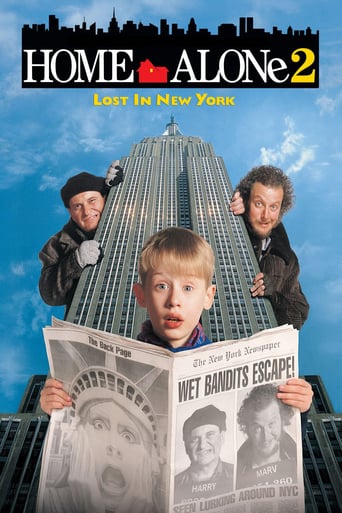The Chalk Garden (1964)
A grandmother seeks a governess for her 16 year old granddaughter, Laurel, who manages to drive away each and every one so far by exposing their past, with a record of three in one week! When an applicant with a mysterious past manages to get the job, Laurel vows to expose her. Meanwhile, Laurel's married-divorced-married mother tries to get her back.
Watch Trailer
Free Trial Channels
Cast


Similar titles
Reviews
Not even bad in a good way
Let's be realistic.
Brilliant and touching
Worth seeing just to witness how winsome it is.
The Chalk Garden is directed by Ronald Neame, has a screenplay by John Michael Hayes which is based on the play by Enid Bagnold and stars Deborah Kerr, Hayley Mills, John Mills, Felix Aylmer, Elizabeth Sellers and Edith Evans.Miss Madrigal(Deborah Kerr)is appointed governess to troubled teenager Laurel(Hayley Mills), she is the latest in a long line of governesses the others having been driven away by the girls terrible behaviour.Laurel lives with her grandmother Mrs. St Maugham(Edith Evans)and their loyal butler Maitland(John Mills).Laurel is a deeply troubled girl who lies, makes up terrible stories and snoops on Maitland and Miss Madrigal to try and learn their deepest secrets, she has discovered Maitland's, will she find Miss Madrigal's? More importantly what if what she discovers is something too shocking to contemplate? Laurel is fascinating because you're never sure if there is some truth in the horrible things she claims. Hayley gives what may just be her best performance, she is so good at conveying the complex nature of this troubled young woman.The entire cast are superb but the greatest praise has to go to Hayley as the uncontrollable Laurel, she steals every scene she is in and it's wonderful to see her work again with her father, I wish they had made more films together. Deborah is excellent as the mysterious woman with a secret who may be the only person who can help Laurel. John Mills is very good as Maitland a man broken by a tragic event in his past who tries to protect Madrigal from Laurel's snooping. The film title refers to the grandmothers garden which is filled with chalk instead of soil because her house is on the chalk cliffs near the beach.
Beg, borrow or steal, but get your hands on this outstanding film. The entire cast give what are arguably their best screen performances, which is saying something since we are talking about Edith Evans, Deborah Kerr, Hayley Mills and John Mills. The script is intelligent, witty and penetrating; the directorial hand is sure and unobtrusive; the camera-work and editing of the highest order: really this (where has it been hiding?) film is one-in-a-hundred good. I am amazed to find it available on on a "vault" release, with no extras or commentary. It deserves recognition and an expanded release. That said, the picture and sound are both excellent.
"The Chalk Garden" is a largely forgotten screen treasure. It focuses on Laurel, a troubled 16-year-old who moved in with her grandmother, Mrs. St. Maugham, in protest against her mother's re-marriage. Mrs. St. Maugham hired various governesses to deal with Laurel; but the young girl quickly drove them away. They failed to comprehend her; but she discovered their deepest secrets, and immediately conveyed these to her grandmother, leading to the dismissals of a succession of governesses. When Mrs. St. Maugham hires Miss Madrigal as the new governess, the tables are turned. Laurel cannot figure out Madrigal—an enigmatic figure, who, although almost aristocratic in bearing, is unable to provide any references. But Madrigal completely comprehends Laurel at once. Olivia, Laurel's mother, plans to reclaim custody of her daughter; but Mrs. St. Maugham is determined to prevent this. Meanwhile, Maitland, the butler/general factotum, tries to keep the household on an even keel.That there is a certain complexity to each of these characters adds credibility and interest to the story. Laurel is a highly inquisitive, intelligent, and analytical person, whose judgments are sometimes very perceptive. Often disrespectful and occasionally obnoxious, in private, Laurel is tormented by loneliness and grief. Mrs. St. Maugham is a generous but domineering woman—she wants the best for Olivia, but feels compelled to impose her choices on her daughter. And Maitland is recovering from his own personal tragedy.There are some weaknesses in the screenplay. In an early scene, Laurel urges Madrigal to smile more because she is beautiful when she smiles, then comments that Madrigal is "quite accomplished" as an artist, and then indicates that she values the governess' compliments about her own painting. It appears that there is in Laurel's view of Madrigal an element of admiration that she had not felt for her other governesses. But the screenplay does not develop Laurel's ambivalent feelings, although these are an important part of the story. Similarly, Olivia's maternal feelings are not much in evidence. We see Olivia primarily in confrontation with her mother. For four years, she has failed to contest custody of Laurel, for reasons that are not satisfactorily explained. Even now, Olivia says she is trying to regain Laurel because she is "my daughter, not yours"—which suggests there is an element of competition as well as compassion in her custody battle. Finally, the screenplay makes an effort to soften Madrigal's past. This weakens the plot. If Madrigal's travails resulted only from a failure of the justice system, what is the relevance of her experience for Laurel's situation? But the script is fundamentally strong. It stimulates concern about Laurel and weaves an air of mystery around Madrigal. It also limns the personalities of the principal characters, and shows how the outcome of the story has implications for all of them. Adult viewers may find themselves waiting to see who will finally tame the troubled teenager. But, in a rather sudden and surprising fashion, Laurel's obnoxious façade is cracked when her own machinations reveal Madrigal's mysterious past. Following this event, a series of carefully crafted dialogs, each with a somewhat unexpected outcome, take the story to its conclusion.Undoubtedly, the greatest strength of "The Chalk Garden" is its world-class cast. And, in view of the extreme close-up photography in the most emotional moments, the actors had to master the tiniest details of their performances. This is the cast you might have assembled if you got your first choice of the actor for each role. Edith Evans (nominated for three Academy Awards from 1963-1967) as Mrs. St. Maugham, and Deborah Kerr (nominated for five Academy Awards from 1953-1960) as Madrigal, were ideal for the roles of the aristocratic elderly British lady and the reserved governess. Many actors could have portrayed an English butler, but, as Maitland, John Mills could also draw on varied talents to toss off insouciant comments to potential governesses and Mrs. Madrigal, and even engage in a physical confrontation with Laurel. The great gamble was to cast Hayley Mills as Laurel. Other cast members had years of experience and had played similar roles in the past. Although she had been nominated for two Academy Awards and had received a special honorary Academy Award, Ms. Mills was only 17, and had never portrayed anyone remotely like Laurel. She must have found certain scenes hugely challenging, as some required her to show almost every emotion and to give credibility to seemingly irrational mood swings. In this reviewers' opinion, it is perhaps her best on-screen performance, and should be required viewing for those who think Mills could portray only Pollyanna-type characters. Felix Aylmer, who had played many "gray eminence" roles, does well as Judge McWhirrey. But, as noted above, Elizabeth Sellars' performance as Olivia, is cramped by the script.The DVD version comes without peripherals, but (fortunately) is in 1.85:1 format. A pan-and-scan version would have been a disaster.
In her A&E "Biography", it was revealed that child actress Hayley Mills apparently got her first mediocre notices from critics with this film, but I do not know why. Mills is engaging and colorful as a 16-year-old with a mind of her own: willful, stubborn, and bratty, she's wonderful on-screen. Deborah Kerr is also very fine, cool-headed and mysteriously reserved playing the new governess in an emotionally-unbalanced household run by haughty matriarch Edith Evans. Talky but entertaining, lively adaptation of Enid Bagnold's play (the title a metaphor for growing something in an improper environment). Exceptionally well-directed by Ronald Neame, who carefully allows the story to unfold like a marvelous novel--one you can get lost in. All the performers, including John Mills as the chief caretaker, are first-rate. Worth finding. ***1/2 from ****

